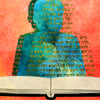In this week’s Torah portion, Jacob leaves (or, more accurately, flees) his home in southern Israel and travels to his mother’s hometown, Charan. The Midrash tells us that while in transit he was robbed of all his possessions by his own nephew, Eliphaz son of Esau.
After a fourteen-year stopover in the great Yeshivah Academy of his time, which was under the leadership of Noah’s great-great-grandson Eber, he finally arrived in Charan. There, his uncle Laban, a shrewd and sly character, scammed and cheated him at every opportunity, even greeting him with warm kisses to check if he might be hiding precious stones in his mouth.
He married Laban’s two daughters, and remained at his father-in-law’s place for twenty years (an admirable feat even under the most normal of circumstances . . .). There he raised eleven of the twelve tribes, and a daughter, in the ways and legacy of his grandfather Abraham and father Isaac, until he finally returned to Israel.
One man, alone in an extremely hostile environment, cheated and hated by his own father-in-law . . .One man, alone in an extremely hostile environment, cheated and hated by his own father-in-law, working all day and night to support his family, away from his holy parents and homeland for more than three decades.
To top it all off, he had that little memory stick in his brain reminding him that if his twin brother Esau were to lay hands on him, he would murder him in cold blood for stealing his blessings.
He could have easily succumbed to the circumstances and pressure, and built an unhealthy home and raised a dysfunctional family. Where the children would hear more “Don’t you dare or I’ll kill you!” than “I love you.” Where the children would know they were different, but couldn’t appreciate why they are different. Sociologists would surely have predicted that he would rear confused children who would grow up with a deep hatred toward the “archaic,” “burdensome” values of their ancestors.
Yet that was not the case: each and every child remained loyal to his heritage, honoring Jacob and assuring the continuity of the Jewish nation.
How admirable for a man to remain strong in his convictions and maintain an indomitable character in the face of opposition and hostility!
My own grandparents, both maternal and paternal, grew up in Communist Russia, where they saw millions of their Jewish brothers and sisters fall for the utopian dreams of Karl Marx and Comrade Lenin. While their neighbors and friends—and for one of my grandparents, his siblings as well—fell for the attractive nonsense, my brave antecedents (and many others) weathered the storm, at great risk to their lives. Today, their descendants, who number deep into the three-digit mark, continue their legacy.
From where did they draw the strength and determination?
You don’t get a backbone of values from learning how to split the atom or from studying 4/5+4-000=__Jacob’s story provides the answer.
Where did he develop this backbone? It was the fourteen years during which he immersed himself in Torah study and prayer. Fourteen years of pristine holiness. Only afterwards did he enter the world of business—in which, by the way, he did phenomenally well.
Similarly, the strength derived from the yeshivahs in which my grandparents studied paid back dividends.
You don’t get a backbone of values from learning how to split the atom or from studying 4/5+4-000=__. Yes, knowledge is vital, but young and impressionable children must, first and foremost, be immersed in the study of values and faith—the Torah.
Teach your child the aleph-bet before the alphabet.
And in just a few years (time flies . . .), when your Jewish grandchildren will come sing “I Have a Little Dreidel” on your lap, you will be grateful that you did.







Join the Discussion